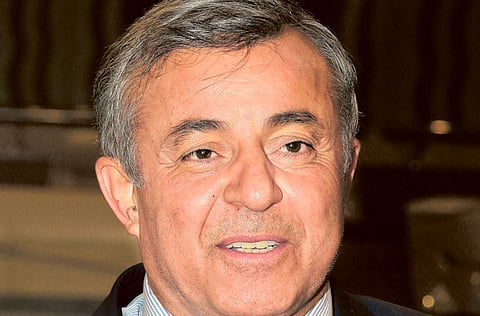Berber Nouri Abu Sahmein elected Libya interim Congress chief
Abu Sahmein is the first member of the long oppressed minority to hold high office

Tripoli: A Berber was voted Libya’s interim leader on Tuesday, the first member of the long oppressed minority to hold high office, but he faces huge challenges addressing growing security concerns.
Meanwhile, on the sidelines of a regional security conference in neighbouring Algeria, a top African Union counter-terrorism official warned that post-Gaddafi Libya had become a major transit hub for terrorists.
Nouri Abu Sahmein, an independent member of the General National Congress (GNC), was elected its head in place of Mohammad Megaryef, who stepped down after a law was adopted barring from politics those who served under veteran dictator Muammar Gaddafi.
He was chosen by the assembly on a second ballot, after leading a nine-candidate first round.
He received 96 out of 184 votes, against 80 for another independent, Al Sherif Al Wafi.
Libya’s two leading parties — the Muslim Brotherhood-backed Party of Justice and Construction and the liberal Alliance of National Forces — did not put forward candidates to head Libya’s highest legislative and executive body.
Abu Sahmein is a law graduate of the University of Benghazi and worked at the Abu Kamash chemical complex from 1978 to 2000.
He was elected to the GNC from his home town of Zuwara and became a rapporteur of the assembly.
Megaryef was Libya’s ambassador to India in the 1980s under Gaddafi before he defected to become a leader of the exiled opposition for three decades.
He was elected to head the GNC last August following Libya’s first post-uprising polls in July.
He stepped down at the end of May to comply with the law passed at the beginning of that month barring Gaddafi-era officials, despite it not having yet come into force.
A number of MPs had proposed exempting him from the law, which bans officials who served under Gaddafi between September 1, 1969 and the overthrow of his regime in October 2011.
The tough challenge facing the new interim leader in restoring security to a country that remains awash with weapons left from the uprising was highlighted by a deadly attack on an army checkpoint earlier on Tuesday.
Unidentified gunmen killed six soldiers south of the Mediterranean city of Sirte, Gaddafi’s hometown.
Libya’s authorities are battling to establish military and security institutions capable of restoring law and order and state authority in the face of armed militias who fought Gaddafi’s forces.
The violence has been particularly acute in second-largest city Benghazi, cradle of the uprising, where Islamists launched a deadly attack on the US consulate on last September.
“I have many reports which say Libya has become a major transit hub for the main terrorist groups travelling from one country to another,” the AU’s special representative in charge of counter-terrorism, Francisco Caetano Jose Madeira, said in Algeria.
Madeira said something “extremely dangerous” for the region as a whole.
The vulnerable security situation in Libya and the porousness of its vast desert borders was a key concern at the two-day security meeting in Oran.
“The question of Libya is on everyone’s mind,” the European Union’s representative for the Sahel region, Michel Reveyrand de Menthon said.
The EU has offered to cooperate with Libya on tightening border security but a Western source said the lack of organisation in the country since Kadhafi’s overthrow currently makes such a project “very difficult.”
Sign up for the Daily Briefing
Get the latest news and updates straight to your inbox

